#vote yes on amendment 3
Text
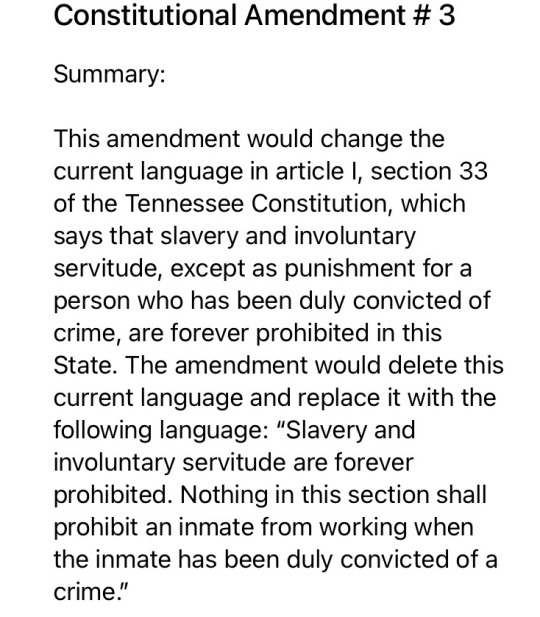

If you live in Tennessee, slavery (underpaid coerced prison labor) is on the ballot. Early voting has already started! Vote yes on amendment 3!
It seems that what this addition says is that convicts will be allowed to have jobs only if they want, but they will not be forced. This seems to be a step in the right direction.
#abolish prison labor#forced prison labor#Tennessee#midterms#2022 midterm elections#vote yes on amendment 3#blm#black lives matter#prison industrial complex#prison abolition#tn government#Tennessee politics#abolish slavery#stop prison labor#end prison labor#criminal justice reform#please vote
3 notes
·
View notes
Text
🚨🚨updates🚨🚨on the other non-KOSA bills that gut encryption (Cooper-Davis, Stop CSAM, Earn IT, etc):
The Senate rn is working on passing the NDAA. This is a must pass bill. Every senator is trying to push through their amendments to the NDAA. These amendments get brought to the floor and added on a majority vote. So far, Cooper-Davis is being planned on being added. IDK what day. The Stop CSAM and Earn It might also be added but either way, all 3 are copy cats of each other in that;
a) they gut encryption
b) they gut parts of Section 230, the one thing that allows anyone to post online and birthed social media
c) they create an unelected commission with some already established govt body (DOJ, FTC, etc) that will include people from NCOSE or other conservative groups who will decide what is and isn't lawful to say
d) lead to mass censorship and surveillance because of the above
resources
WHAT TO DO NEXT
1) Drive as many calls and emails to as many senators as possible. Yes still to Cantwell and Schumer but to your own senators as well and any you think would be influential (i.e., Padilla in Earn It, etc). Drive as many as you can, use all your emails, call everyday about these bills to end encryption.
2) Post on social media everywhere about this and about We are seriously counting on you.
On KOSA:
Continue to drive calls to Cantwell and Schumer opposing it and thank them for standing firm against bad bills that will only hurt more than help. Emphasize you are a member of Gen Z/Millenial and grew up on the internet and don't want this.
OTHER RESOURCES
We need to make sure Cooper-Davis and the others are not added. Time is essential and we have so very little of it. Please please please do this. These bills are 1000x more dangerous than KOSA could be.
#lgbtqia+#lgbtq+#lgbt#lgbtqia#lgbtq#lgbt nsft#gay#lesbian#bisexual#panseuxal#trans#transgender#trans rights#gay rights#asexual#aromantic#aroace#oppenheimer#barbie movie#generation loss#vocaloid#artists on tumblr#art#aesthetic#catgirl
843 notes
·
View notes
Text
Tuesday is Election Day in many parts of the US.
VOTE! 🗳 🇺🇸
A number of sites provide you with an opportunity to see who is on your ballot and what issues are being contested. They don't include an actual image of your ballot but they do let you know what's on it.
VOTE411 Voter Guide
Sample Ballot Lookup - Ballotpedia
Vote Informed on the Entire Ballot - BallotReady
Of course check the site of your local election authority. In some places it's the county clerk and in others it's a board of elections. The elections mentioned in this post are a small number of those around the US on November 7th.
Because of the GOP SCOTUS overturning of Roe v. Wade, state legislatures now determine whether a state supports reproductive freedom or not. State governments have been badly neglected by liberals for decades — and that situation needs to end.
Both chambers of the state legislature in Virginia are up for election on Tuesday. If both fall under Republican control then the state will join the rest of the South in restricting abortion.
Virginia is not the only state having elections for its state officials.
STATES HOLDING ELECTIONS FOR STATE LEGISLATURE
Virginia
New Jersey
Mississippi
Louisiana
STATES HOLDING ELECTIONS FOR GOVERNOR
Kentucky
Louisiana
Mississippi
There are numerous municipal elections, special elections, ballot measures, and constitutional amendments to be decided on Tuesday.
The biggie is the Ohio constitutional amendment on reproductive freedom. Voters in Ohio have the opportunity to overturn the gerrymandered Ohio Republican legislature's ban on abortion. Vote YES on Ohio Issue 1.
A very local but important contest is the special legislative election in New Hampshire to fill a vacancy in Hillsborough County District 3 (in the Nashua area). Right now Republicans have a one seat advantage in the New Hampshire House of Representatives. If Democrat Paige Beauchemin wins this seat then Republicans will be forced to share power with Democrats in the chamber.

Good candidates for federal office often emerge from state and local government. Before he was elected to the US Senate in 2004, Barack Obama served several terms in the Illinois legislature.
There is no such thing as an unimportant election.

#election 2023#vote!#reproductive freedom#roe v. wade#ohio issue 1#state legislatures#virginia#louisiana#new jersey#mississippi#governors#kentucky#new hampshire special election#paige beauchemin#there is no such thing as an unimportant election#vote blue no matter who#never miss an election#vote locally think nationally
70 notes
·
View notes
Text
#061 - The Best News of Last Week - October 31, 2022
🎃 — Happy Halloween! Let’s read some good news to start the week!
1. A New Climate Reality Is Coming Into View — in just 5 years humanity has cut expected warming almost in half

Nice to see balance coming in on this stuff. The situation is *not good*, but the reporting and social focus until now has been “…and therefore you are doomed.” This causes apathy, just like when people say “all politicians are the same” when they are very clearly not.
We need to focus both on how bad things are, but also the solutions for how we get through this. They exist, and we can have them. It’s going to be a life-long fight, especially once you realize that certain people make a lot more money if you think you’re doomed.
2. Germany plans to legalise recreational cannabis

Germany’s coalition government has agreed on a plan to legalise recreational cannabis use among adults.
Possession of up to 30g (1oz) for personal use would be allowed. Licensed shops and pharmacies would sell it.
3. Hundreds of rare birds rescued from island cut off by Hurricane Ian

Volunteers helped transport the flock from a bird sanctuary to a temporary new home, where they’ll stay until bridge access can be restored to Pine Island.
The birds have been relying on food donated by wildlife officials since Hurricane Ian hit, but the supply of fruit, peanuts and other edibles would soon be hard to come by because of the downed bridge and the scarcity of gasoline on the island. In the hours before the storm, the sanctuary owners herded their flock of birds and packed them into their home to shield them from the ferocity of the elements.
4. A train passenger saw a woman waving for help. It was a hiker who’d been missing.

An injured hiker near Silverton, Colo., was rescued earlier this month after a train passenger spotted her from the window. She was frantically waving on the other side of a river, having just spent two days trapped in the wilderness with a broken leg.
The rider alerted the crew of the Durango & Silverton Narrow Gauge diesel engine №461, according to the San Juan County Office of Emergency Management. They then notified the train inspector, Delton Henry, who was in a motor car behind them.
5. Same-sex marriage is now legal in all of Mexico’s states

Lawmakers in the state of Tamaulipas voted Wednesday night to legalize same-sex marriages, becoming the last of Mexico’s 32 states to authorize such unions.
The measure to amend the state’s Civil Code passed with 23 votes in favor, 12 against and two abstentions, setting off cheers of “Yes, we can!” from supporters of the change.
6. North Expedition finds cache of cameras on remote Yukon glacier, 85 years after mountaineer left them behind

A DeVry “lunchbox” camera left behind on Mount Lucania in 1937. An expedition team recently uncovered the camera along with other artifacts stashed by legendary mountaineer Bradford Washburn 85 years ago
The team recovered a portion of Washburn’s cherished aerial F-8 camera — a format he would later become known for worldwide — as well as two motion picture cameras and old climbing gear, tents and cooking items. (That included part of a T-bone steak, Post noted — “They were eating pretty well out there, it appeared.”)
“It was just the full array of gear from what they were using in the 1930s,” said Post, a professional skier and mountain explorer.
7. Ray of joy: Nasa captures image of the sun ‘smiling’


That’s it for this week. If you liked this post you can support this newsletter with a small kofi donation:
Buy me a coffee ❤️
252 notes
·
View notes
Text
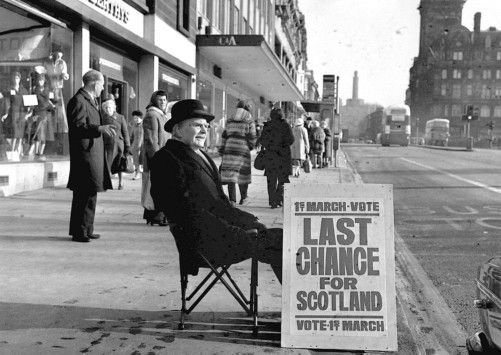

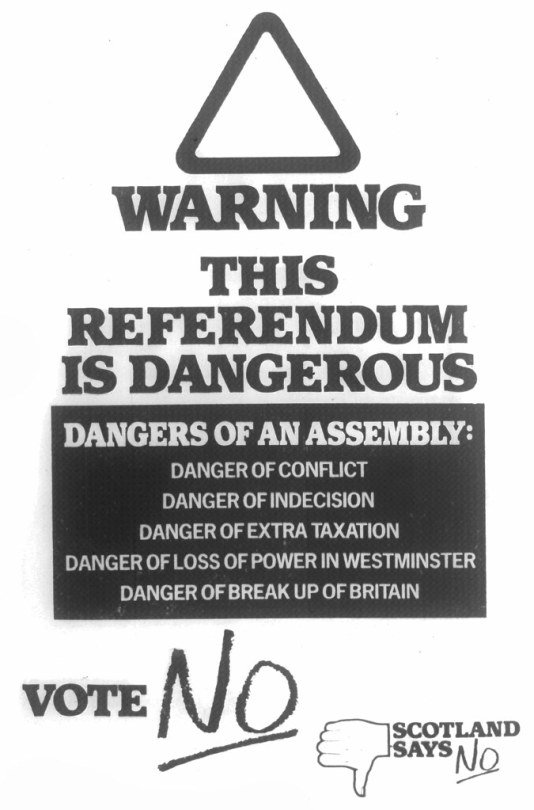
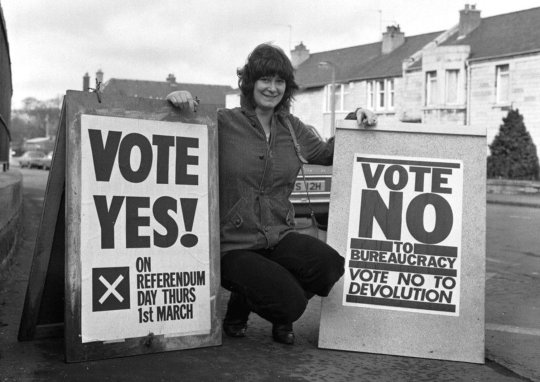



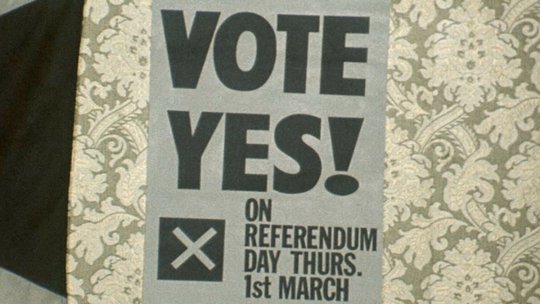
On March 1st 1979 Scots voted in favour of Devolution, but failed to reach the required 40% of the population in favour of implementing it - due to 36% of the electorate not voting.
THE PLOT.
The introduction of devolution legislation in 1976 was largely the product of nationalist pressures on the Government. James Callaghan's Labour government had a majority of only three after the 1974 (October) election and by 1977 had no majority at all after a series of by-election defeats. The government was therefore vulnerable to pressures from the Scottish National Party and Plaid Cymru, who between them won 14 seats at the election (SNP 11, Plaid Cymru 3). The Kilbrandon commission had reported in 1974, recommending the establishment of a Scottish parliament and endorsing the principle of devolution.
A combined Scotland and Wales Bill was introduced in November 1976. It gained a second reading only after referendums in both Scotland and Wales had been conceded. The Shadow Secretary of State for Scotland, Alick Buchanan-Smith, and one of his front benchers, Malcolm Rifkind, resigned their posts when the Shadow Cabinet decided to oppose its second reading. On the first day of committee 350 amendments were put down. Michael Foot, (then Lord President and Cabinet Minister responsible for the devolution bill) was reluctant to impose a guillotine. After nearly 100 hours of debate only three and a half clauses of the bill had been considered. A guillotine motion was tabled but defeated in February 1977. The Bill was withdrawn.
In November 1977 separate Bills for Scotland and Wales were introduced, with support from the Liberals. This reduced opposition from those who had previously opposed the combined Bill on the grounds that the Welsh did not really want devolution. This time the guillotine motion was won.
As the committee stage was nearing its end, it scrutinised an amendment from Labour backbencher George Cunningham. It required the Secretary of State to lay before Parliament an order repealing the Act unless at least 40% of the eligible electorate voted "yes". The amendment was strongly opposed by the Government, but they lost the vote by 166 votes to 151.
In the referendum, on 1st March 1979, Scotland voted in favour of devolution by 52% to 48% - but only 32.9% of the electorate had joined the majority. In Wales the vote was against devolution, by 80% to 20%. The Acts were repealed the next month.
The Government was not helped by the extent of internal dissent within the Labour party. There was an active Labour 'Vote No' campaign in Scotland, of which Brian Wilson was Chairman, and Robin Cook a Vice-Chairman together with Tam Dalyell.
In Wales, Neil Kinnock was among those who campaigned for a "no" vote. During the last few days of the campaign in Wales, the pro-devolution Labour party -TUC group argued that a "No" vote would be a vote for the Tories, and a vote against the Government. This was a gamble that did not pay off; the scale of the "No" victory meant that those who had campaigned against the government could feel vindicated.
A motion of no confidence in the government was tabled by the Conservatives and supported by the SNP, the Liberals and eight Ulster Unionists. This motion was carried by one vote on 28th March 1979. The next day Callaghan announced that Parliament would be dissolved.
The 1979 Results:
Scotland: Question: Do you want the provisions of the Scotland Act 1978 to be put into effect ?
Yes 1,230,937 (51.6%)
No 1,153, 502 (48.4%)
Rejected ballot papers 3,133
Electorate 3, 747,112
Turnout 63.6%
But, we Scots are known the world over for this saying. Try, try and try again we did and won our parliament. We did and we put the party in powder who would take us to freedom. We will never give up our fight to be an Independent country once more.
19 notes
·
View notes
Note
VIREN LOVE PROPAGANDA:
are his moral decisions dubious at best. yes. does he mistreat his kids to the point of one of them joining a group of rebels to betray him. also yes (good for that kid btw. ily soren). HOWEVER especially at the start of uhh i think it was season 3??? i really REALLY loved his how his character was handled it was so compelling.
to keep this vague so it can remain spoiler-light, in his pursuit of power he had a traumatic experience which they showed him reacting to very nicely (satisfactorily, not like, pleasant for him). he had an incredibly humanized character and was shown to have some kind of remorse/regret for his actions, and ended up kind of pathetically pushed around by another character because he really just wanted to reform/heal/live a peaceful life/make amends. it was delightful to see and made me love him that much more.
in conclusion please vote love for my pathetic sopping wet old man. in the name of interesting character development and execution
13 notes
·
View notes
Text
All's Fair in Love and Politics (a modern Nessian AU - where Rhys is running for president)
Summary: In the ruthless arena of politics, victory demands risking everything, even one's own heart. Rhysand has his eyes on the presidency. Feyre convinces her estranged sister, Nesta, to join the political campaign. As the campaign intensifies, Nesta and Cassian find themselves forging an unexpected bond. But can their budding romance survive the treacherous waters of modern political warfare?
(Nessian focused but lots of Feysand to keep things interesting.)
Read on AO3 / Chapter 1 / Chapter 2
Chapter 3
"Eris?" Gwyn looked surprised, her bright teal eyes catching the name flashing across Nesta's phone screen.
Nesta left her phone facing up on the table during Sunday brunch with her two best friends -- a tactical error. Nesta quickly sent the call to voicemail and slipped her phone into her bag.
"Again?" Emerie smirked from behind her coffee cup.
Nesta felt her face burn red. "I ran into him at the Hewn charity gala," she pushed her food around with her fork. "I don't know why he's calling."
Gwyn huffed. "I can't believe you saw Eris before you made time to see us," she teased.
"Things have been crazy with the campaign. And the gala was a work event," Nesta looked contrite. "When's your train back to New York, Gwyn? Do you have time to drop by Emerie's shop with me?"
"Don't change the subject," Gwyn's eyes twinkled. "Now we need to know what happened with Eris last night."
"I -- he -- " Nesta started, her face turning an even deeper shade of red, but found that she couldn't bring herself to say out loud that she had gone home with Eris for hate sex. "You two are the worst," she said instead.
Gwyn knew Nesta well enough to make the inference. "I thought you couldn't stand him!" Her face was equal parts surprise and amusement.
Emerie snickered. "No. They're friends with benefits."
"We are not friends!" Nesta hissed.
"Fine," Emerie was enjoying this entirely too much. "They are frenemies with benefits."
Nesta opened her mouth to reply but then said nothing.
Gwyn glanced between Nesta and Emerie and let out a laugh. "So are the benefits good at least?" Gwyn asked surreptitiously.
Nesta suddenly felt self-conscious. She tugged the collar of her blouse higher, hoping the red bruise Eris had left on the crook of her neck remained hidden.
"I'm going to take that as a yes," Emerie observed.
Gwyn nodded. "That's definitely a yes."
---
Mercifully, Gwyn and Emerie let Nesta off the hook for the remainder of their brunch.
Nesta had dearly missed spending time with her two best friends. After college, they had all moved to different cities but still made time to meet up regularly. Gwyn headed a women's advocacy non-profit in New York City ("God, I miss having you in the City," Gwyn had said when she arrived in DC). Emerie owned a women's fashion boutique in Alexandria ("I'm so happy to have you close by now," Emerie retorted. "But I better see you more often from now on," she had admonished).
Their conversations flowed easily. Gwyn and Emerie both wanted to know more about Rhys ("Is he as handsome in person as he is in photos?"). They peppered Emerie with questions about the new woman she was dating ("What was her family like?" "Was she a cat person or a dog person?").
They both listened sympathetically when Nesta told them about Elain and Feyre. Gwyn wrapped Nesta into a tight, loving hug ("These things take time."). Until then, Nesta hadn't realized how much she needed to hear those words.
---
Cassian paced around Rhys's office Monday morning. The vote for the immigration bill was delayed.
"Beron is up to something," Azriel said from his corner. His eyes followed Cassian back and forth in the limited space -- they had removed all the visitor chairs from the room now that the team was bigger.
"He's gathering his forces for an ugly floor fight."
Rhys nodded in agreement. "I only told him I'd think about adding the amendment. It would no doubt kill the bill. He must have approached other members of the House about it too."
Feyre frowned. "It doesn't make any sense," she mused. "It would be politically beneficial for Beron and the party to pass the bill as is. Why is he trying to sabotage his own legislative priorities?"
Cassian shook his head. "As Speaker, he put the bill up to a floor vote. But now he's playing dirty behind the scenes," he turned to Rhys. "I never thought he actually wanted immigration reform."
Rhys looked down at his hands, considering their comments.
"We need to position our office as being pro-immigration," Amren said. She turned to Nesta, "Can you come up with some language on this -- our position for a press release?"
Nesta settled her gaze on Rhys. "That depends," she said, a challenge. "On what Rhys thinks about immigration reform."
Rhys turned his full attention to Nesta. "I support everything in the current bill," he said.
Nesta rolled her eyes. "What do you actually believe?"
Rhys paused, his face unreadable. The question hung in the air.
A knock sounded at the door. A young lady poked her head into the room. "Excuse me, sir, sorry to interrupt," the staffer said apprehensively, her face flushed. "All the members are being called to the floor."
Rhys rose from his chair. "We'll continue this later," he said to Nesta on his way out the door, the young staffer at his heels.
Nesta looked after him and frowned. She didn't like how Rhys avoided her more probing questions regarding his political agenda. Was Rhys waiting to see which way the political winds would blow before settling on his policy goals?
Azriel picked up his laptop and papers. "We still need to figure out what Beron's trying to pull," he said, scrolling through his phone. "Let me make some calls. Maybe someone in the Speaker's office is willing to enlighten us."
Nesta was still looking out the open door after Rhys's disappearing form. "Don't bother," she said. "I'll talk to Eris."
Everyone in the room went still.
Nesta turned to Azriel and observed that his lips were drawn into a tight line. "Eris had been calling," she explained. "So I'll call him back."
Cassian's jaw worked. "I don't think that's a good idea," he said slowly.
"Eris wants the bill to pass," Nesta said, getting impatient. "He'll play ball."
Cassian started pacing again, avoiding looking in Nesta's direction.
Azriel's frown deepened.
Amren surveyed Nesta while drumming her manicured fingers on the surface of the desk. "Do I need to worry about you and Eris?" Amren asked carefully.
"Excuse me?" Nesta's voice rose. She looked between Amren, Azriel, and Feyre. They were all studying her with interest. She didn't know whether to be insulted or outraged. She knew she didn't like the implication of the question.
"I am a professional and I'll conduct myself as such. I expect the same from all of you." Nesta's tone was brusque.
Amren hesitated but looked to Feyre.
The sisters stared at each other intently. "I trust you and your judgment," Feyre finally said. Nesta let out a breath she didn't know she was holding.
Amren nodded. "Fine, call Eris for a meeting," then she pointed at Cassian. "You're going with her."
"I don't need a chaperon." Nesta crossed her arms.
Amren looked out the window, her eyes searching for some distant object outside. "I have no doubt you can handle yourself, girl," she said. "But Eris needs to be reminded of who he's jostling with."
---
"Look who finally decided to return my calls." Eris's voice crackled over Nesta's speaker. Cassian stood next to her, his eyes on her phone. Amren had insisted they work as a team, and then Cassian insisted on listening in on the call.
"I'm already regretting this," Nesta retorted, rolling her eyes at both her phone and Cassian.
"I'll make it worth your while," Eris's tone was lurid. Cassian raised his eyebrows.
Nesta looked up at Cassian. Something twisted in her at the pained expression on his handsome face. Cassian held her gaze and nodded grimly for her to continue.
"Just tell me where to meet you," she said.
---
Eris picked a tiny diner on the outskirts of the city for their meeting the next day. He was surprised to see Nesta walk in with Cassian's towering figure behind her.
"I didn't know this was bring your child to work day," Eris told her drily, barely acknowledging Cassian's presence. He gave Nesta a quick kiss on her cheek and then gestured for them to sit in the booth across from him.
The diner looked like it hadn't been updated since the 1950s, with checkered linoleum floors and bright red benches. Cassian scanned the long rectangular space. They were the only ones there except for the wait staff.
Nesta was nervous to meet Eris with Cassian. On their drive here, they only spoke to each other in short curt sentences, going over what they would ask Eris. She had opened her computer in the passenger seat and worked on the immigration press release. Her years of reporting had trained her well for writing on moving vehicles. Cassian was a quiet, comforting presence beside her -- he left her to her work and focused on navigating through traffic.
A waitress came up to their table. "What can I get you folks?"
"Just coffee," Cassian said and crossed his arms.
"Same for me."
"The beautiful lady will have a slice of your chocolate cake, Alis," Eris smiled. "And I'll take the lunch special." After the waitress left, Eris turned to Nesta -- she arched an eyebrow -- and added, "It's the best chocolate cake in DC, I swear."
Cassian looked like he was ready to throttle Eris. "You come here often?" he asked sharply.
"Something like that," Eris's face was impassive. "Nesta didn't mention she was babysitting."
Alis returned with three mugs of coffee before Cassian could respond.
"Why are we here, Eris?" Nesta asked. She could already feel her annoyance surfacing.
"I told you the chocolate cake is amazing," Eris gave her a wicked grin.
Cassian drank his coffee, letting Nesta take the lead as they had discussed.
"Well, out with it," Nesta said with disdain. "What did you want tell me that can't be said over the phone?"
Eris pouted. "If you had stayed the night," he drawled. "I would have told you in the morning."
Nesta refused to let Eris rile her up. She gave a quick side glance to Cassian. His face went dark. Nesta felt a twinge of remorse -- she didn't want to drag Cassian into her twisted alliance with a scoundrel like Eris. She didn't want Cassian to think that she took satisfaction in any of this.
"We don't have time for idle talk, Eris," Nesta said, keeping her voice neutral.
Alis came by again with a sandwich on one plate and a huge piece of chocolate cake on another. They fell silent as Alis walked back to the counter.
Instead of responding, Eris picked up his sandwich and took a bite. He looked at Nesta expectedly.
Nest sighed, unwrapped the fork from a napkin, and ate a piece of the cake. She hated that it was the best chocolate cake she had in a long while.
Cassian was visibly pissed off.
Satisfied, Eris took another bite of his sandwich and chewed slowly. "Beron doesn't care whether the immigration bill lives or dies," he finally said.
"Why did he put the bill on the floor then?" Nesta put her fork down.
"Beron allowed the bill to come to a floor vote to appease the progressive wing of the party," Eris continued. "They have been threatening to revolt."
"We know," Cassian said. He shifted in his seat, his knee knocked against Nesta's. She blinked.
"Beron doesn't care what happens to immigration reform," Eris looked bored. "He just doesn't want the progressives to get too big for their britches."
"So this poison pill amendment is just to teach them a lesson?" Nesta asked.
"Beron wants them back in line," Eris affirmed.
Cassian and Nesta exchanged a look.
"You know," Eris nudged the cake towards Nesta again. "Tarquin has been pushing for a more strigent clean energy bill, close the loopholes for large corporations. He's been looking for the right co-sponsor."
Nesta nodded, understanding. Tarquin was the leader of the progressive caucus -- maybe, just maybe, there can be a deal.
Cassian looked at Eris pointedly, picked up Nesta's fork, and took a bite of cake. "Mmm, delicious," Cassian moaned theatrically. Nesta's lips quirked upwards into a slow smile.
Eris furrowed his brow in surprise.
Cassian swallowed, licking his lip. "And the defense budget?" Cassian asked deliberately. "Why is Beron pressing for a 20% increase?"
Eris pushed his plate away from him. He leaned back in his seat and assessed Cassian. "Does Starborn support widening the war in the Middle East?" Eris asked in response.
"Rhys served three tours in Afganistan," Cassian replied cooly. "His military record is unimpeachable."
"Does Starborn support widening the war?" Eris asked again.
This time, Cassian said nothing.
Eris looked smug. "That's what I thought." He stood up, put on his immaculate Italian wool jacket, and dropped a $20 bill on the table. "I'll call you later," Eris winked at Nesta and walked out the door.
---
---
---
Please let me know if you want to be added/removed from the tag list.
Tag list: @acourtofladydeath @fwiggle @swifti-ed
#fanfic#a court of silver flames#a court of thorns and roses#cassian#nessian#nesta#acosf#acotar#nesta archeron#nesta x cassian#modern au#political au#eris vanserra#all's fair in love and politics
18 notes
·
View notes
Text
“The ERA went down in defeat in Illinois on June 22, 1982, but not before those of us in the galleries had had the rare good fortune to witness one of the most stunning performances in history. Monica Faith Stewart, a Black legislator from Chicago's South Side, stood and spoke with a feminist defiance equaled only by Sojourner Truth. She, like us, knew the House would reject the ERA. There was no reason not to tell it like it was:
. . . . I don't stand here to petition your yes vote, because what is your constitution to me? The Declaration of Independence was drafted by a man who, yes, was a founding father; who, yes, was a great economist; but yes, he was a slave holder, and yes, for 37 years, he went into the bed of his slave, who he thought was the perfect woman. Why? Because she was a slave. And so gentlemen, what is your constitution to me?
. . . . You can vote this amendment up or down; quite frankly, it doesn't make any difference to me. I think you are acting as people of your class and tradition have always acted, and you know what? It won't matter, because we've survived much worse than this. Back when I was in school, we had a saying, that if things didn't go the way you liked them in the classroom, we'd meet you outside at 3:15. And so, white males of the world, it is now 3:15. I represent the majority of people on this planet who are women, the majority of people on this planet who are of color, and you cannot have your sovereignty any longer. Why? Because I say so!
Up in the galleries, the applause fairly exploded as hundreds of us rose to our feet as one, stamping and shouting. Overcome with admiration for her, and with gratitude, heartsick and angry and proud, we turned and wept in one another's arms.
When the Illinois House defeated the ERA that day— by only five votes: 103 to 74 (the 103 votes were cast in favor of the ERA, but with Illinois' anti-democratic 3/5 requirement, we were the losers) — national ratification was impossible. The long decade of hoping and dreaming and struggling for justice was over. We agreed that there was no point in continuing the fast. So at our last press conference the next morning, we broke it officially, toasting one another and the press with grape juice in plastic wine glasses.
In the meantime, back at the motel, reporters wanted to know what we had learned from this. I said that what I had learned—again—was that women cannot trust men to represent us. We cannot work through men. "It's like trusting the slave-holders to represent the slaves," I told the scribbling pencils. Whatever lingering illusions I might have had about the representativeness of the government of the United States of America died quietly and forever that day. When the ERA went down, women all over the country lost their faith in God: how could a loving, just God not have heard and answered women's most fervent, most passionate, most righteous prayers? they asked. This did not trouble me. What I lost were the last wispy shreds of my faith in this system of government.”
-Sonia Johnson, Going Out of Our Minds: The Metaphysics of Liberation
#sonia johnson#equal rights amendment#fasting as protest#female oppression#amerika#misogyny in government#males don’t see women as human
41 notes
·
View notes
Text
my constitutional amendment proposals (typed out at 3:24 am)
- guaranteed right to vote. “all citizens of the united states aged 18 or over are guaranteed the right to vote by the us constitution, congress shall make any law to enact his amendment etc.” i’m willing to go as young as 15 or 14 on lowering the voting age like when you get to high school you can vote in local/state/fed elections but that might be reaching for the stars and 18 is pretty reasonable. also this amendment changes election day to november 11th veterans day cus we already get the day off it’s a national holiday just seems like we should vote then makes sense
- repeal the 2nd amendment. i don’t know the exact verbiage they would do i’d have to reread the 21st but just like. repeal the 2nd amendment no more legal justifications for guns full stop
- i’ve been thinking about a “right to bodily autonomy” and im sure there’s a better way to phrase it but something that enshrines the right to abortion, gay marriage, and gender expression in one right like “there shall be no law in the united states that infringes on a persons right to an abortion, same sex marriage, or preferred gender expression” and i want to be very careful and very concise with the language here like you have to say “same sex marriage” instead of “non traditional marriage” for example cus non traditional marriage could mean literally anything. basically this whole thing is the era with protections for gay and trans people. and also i want this right to finally decree women, gay people and trans people are federally protected classes.
- supreme court term limits. the number i’ve heard is 18 years staggered and a fixed court at 9 justices
- national referendums. we should have national referendums like i get that we don’t cus we’re not a parliamentarian system we’re not even a true democracy it’s a republic but it would be nice if we could have like “should we ban all high capacity magazines [ ] yes [ ] no” on a general election ballot
2 notes
·
View notes
Text
Someone wrote this as a factual historically backed response to the claim that somehow Democrats and Republicans changed sides.
June 17, 1854
The Republican Party is officially founded as an abolitionist party to slavery in the United States.
October 13, 1858
During the Lincoln-Douglas debates, U.S. Senator Stephen Douglas (D-IL) said, “If you desire negro citizenship, if you desire to allow them to come into the State and settle with the white man, if you desire them to vote on an equality with yourselves, and to make them eligible to office, to serve on juries, and to adjudge your rights, then support Mr. Lincoln and the Black Republican party, who are in favor of the citizenship of the negro. For one, I am opposed to negro citizenship in any and every form. I believe this Government was made on the white basis. I believe it was made by white men for the benefit of white men and their posterity for ever, and I am in favor of confining citizenship to white men, men of European birth and descent, instead of conferring it upon negroes, Indians, and other inferior races.”. Douglas became the Democrat Party’s 1860 presidential nominee.
April 16, 1862
President Lincoln signed the bill abolishing slavery in the District of Columbia. In Congress, almost every Republican voted for yes and most Democrats voted no.
July 17, 1862
Over unanimous Democrat opposition, the Republican Congress passed The Confiscation Act stating that slaves of the Confederacy “shall be forever free”.
April 8, 1864
The 13th Amendment banning slavery passed the U.S. Senate with 100% Republican support, 63% Democrat opposition.
January 31, 1865
The 13th Amendment banning slavery passed the U.S. House with unanimous Republican support and intense Democrat opposition.November 22, 1865
Republicans denounced the Democrat legislature of Mississippi for enacting the “black codes” which institutionalized racial discrimination.
February 5, 1866
U.S. Rep. Thaddeus Stevens (R-PA) introduced legislation (successfully opposed by Democrat President Andrew Johnson) to implement “40 acres and a mule” relief by distributing land to former slaves.
March 27, 1866
Democrat President Andrew Johnson vetoes of law granting voting rights to blacks.
May 10, 1866
The U.S. House passed the Republicans’ 14th Amendment guaranteeing due process and equal protection of the laws to all citizens. 100% of Democrats vote no.
June 8, 1866
The U.S. Senate passed the Republicans’ 14th Amendment guaranteeing due process and equal protection of the law to all citizens. 94% of Republicans vote yes and 100% of Democrats vote no.
March 27, 1866
Democrat President Andrew Johnson vetoes of law granting voting rights to blacks in the District of Columbia.
July 16, 1866
The Republican Congress overrode Democrat President Andrew Johnson’s veto of legislation protecting the voting rights of blacks.
March 30, 1868
Republicans begin the impeachment trial of Democrat President Andrew Johnson who declared, “This is a country for white men, and by God, as long as I am President, it shall be a government of white men.”September 12, 1868
Civil rights activist Tunis Campbell and 24 other blacks in the Georgia Senate (all Republicans) were expelled by the Democrat majority and would later be reinstated by the Republican Congress.
October 7, 1868
Republicans denounced Democrat Party’s national campaign theme: “This is a white man’s country: Let white men rule.”
October 22, 1868
While campaigning for re-election, Republican U.S. Rep. James Hinds (R-AR) was assassinated by Democrat terrorists who organized as the Ku Klux Klan. Hinds was the first sitting congressman to be murdered while in office.
December 10, 1869
Republican Gov. John Campbell of the Wyoming Territory signed the FIRST-in-nation law granting women the right to vote and hold public office.
February 3, 1870
After passing the House with 98% Republican support and 97% Democrat opposition, Republicans’ 15th Amendment was ratified, granting the vote to ALL Americans regardless of race.
February 25, 1870
Hiram Rhodes Revels (R-MS) becomes the first black to be seated in the United States Senate.
May 31, 1870
President U.S. Grant signed the Republicans’ Enforcement Act providing stiff penalties for depriving any American’s civil rights.
June 22, 1870
Ohio Rep. Williams Lawrence created the U.S. Department of Justice to safeguard the civil rights of blacks against Democrats in the South.
September 6, 1870
Women voted in Wyoming in first election after women’s suffrage signed into law by Republican Gov. John Campbell.
February 1, 1871
Rep. Jefferson Franklin Long (R-GA) became the first black to speak on the floor of the U.S. House of Representatives.
February 28, 1871
The Republican Congress passed the Civil Rights Act of 1871 providing federal protection for black voters.
April 20, 1871
The Republican Congress enacted the Ku Klux Klan Act, outlawing Democrat Party-affiliated terrorist groups which oppressed blacks and all those who supported them.
October 10, 1871
Following warnings by Philadelphia Democrats against black voting, Republican civil rights activist Octavius Catto was murdered by a Democrat Party operative. His military funeral was attended by thousands.
October 18, 1871
After violence against Republicans in South Carolina, President Ulysses Grant deployed U.S. troops to combat Democrat Ku Klux Klan terrorists.
November 18, 1872
Susan B. Anthony was arrested for voting after boasting to Elizabeth Cady Stanton that she voted for “Well, I have gone and done it — positively voted the straight Republican ticket.”January 17, 1874
Armed Democrats seized the Texas state government, ending Republican efforts to racially integrate.
September 14, 1874
Democrat white supremacists seized the Louisiana statehouse in attempt to overthrow the racially-integrated administration of Republican Governor William Kellogg. Twenty-seven were killed.
March 1, 1875
The Civil Rights Act of 1875, guaranteeing access to public accommodations without regard to race, was signed by Republican President U.S. Grant and passed with 92% Republican support over 100% Democrat opposition.
January 10, 1878
U.S. Senator Aaron Sargent (R-CA) introduced the Susan B. Anthony amendment for women’s suffrage. The Democrat-controlled Senate defeated it four times before the election of a Republican House and Senate that guaranteed its approval in 1919.
February 8, 1894
The Democrat Congress and Democrat President Grover Cleveland joined to repeal the Republicans’ Enforcement Act which had enabled blacks to vote.
January 15, 1901
Republican Booker T. Washington protested the Alabama Democrat Party’s refusal to permit voting by blacks.
May 29, 1902
Virginia Democrats implemented a new state constitution condemned by Republicans as illegal, reducing black voter registration by almost 90%.
February 12, 1909
On the 100th anniversary of Abraham Lincoln’s birth, black Republicans and women’s suffragists Ida Wells and Mary Terrell co-founded the National Association for the Advancement of Colored People.
May 21, 1919
The Republican House passed a constitutional amendment granting women the vote with 85% of Republicans and only 54% of Democrats in favor. In the Senate 80% of Republicans voted yes and almost half of Democrats voted no.
August 18, 1920
The Republican-authored 19th Amendment giving women the right to vote became part of the Constitution. Twenty-six of the 36 states needed to ratify had Republican-controlled legislatures.
January 26, 1922
The House passed a bill authored by U.S. Rep. Leonidas Dyer (R-MO) making lynching a federal crime. Senate Democrats blocked it by filibuster.
June 2, 1924
Republican President Calvin Coolidge signed a bill passed by the Republican Congress granting U.S. citizenship to all Native Americans.
October 3, 1924
Republicans denounced three-time Democrat presidential nominee William Jennings Bryan for defending the Ku Klux Klan at the 1924 Democratic National Convention.
June 12, 1929
First Lady Lou Hoover invited the wife of black Rep. Oscar De Priest (R-IL) to tea at the White House, sparking protests by Democrats across the country.
August 17, 1937
Republicans organized opposition to former Ku Klux Klansman and Democrat U.S. Senator Hugo Black who was later appointed to the U.S. Supreme Court by FDR. Black’s Klan background was hidden until after confirmation.
June 24, 1940
The Republican Party platform called for the integration of the Armed Forces. For the balance of his terms in office, President Franklin Delano Roosevelt (D) refused to order it.
August 8, 1945
Republicans condemned Harry Truman’s surprise use of the atomic bomb in Japan. It began two days after the Hiroshima bombing when former Republican President Herbert Hoover wrote that “The use of the atomic bomb, with its indiscriminate killing of women and children, revolts my soul.”
May 17, 1954
Earl Warren, California’s three-term Republican Governor and 1948 Republican vice presidential nominee, was nominated to be Chief Justice delivered the landmark decision “Brown v. Board of Education”.
November 25, 1955
Republican President Dwight D. Eisenhower’s administration banned racial segregation of interstate bus travel.
March 12, 1956
Ninety-seven Democrats in Congress condemned the Supreme Court’s “Brown v. Board of Education” decision and pledged (Southern Manifesto) to continue segregation.
June 5, 1956
Republican federal judge Frank Johnson ruled in favor of the Rosa Parks decision striking down the “blacks in the back of the bus” law.
November 6, 1956
African-American civil rights leaders Martin Luther King and Ralph Abernathy voted for Republican Dwight Eisenhower for President.
September 9, 1957
President Eisenhower signed the Republican Party’s 1957 Civil Rights Act.
September 24, 1957
Sparking criticism from Democrats such as Senators John Kennedy and Lyndon Johnson, President Eisenhower deployed the 82nd Airborne Division to Little Rock, AR to force Democrat Governor Orval Faubus to integrate their public schools.
May 6, 1960
President Eisenhower signed the Republicans’ Civil Rights Act of 1960, overcoming a 125-hour, ’round-the-clock filibuster by 18 Senate Democrats.
May 2, 1963
Republicans condemned Bull Connor, the Democrat “Commissioner of Public Safety” in Birmingham, AL for arresting over 2,000 black schoolchildren marching for their civil rights.
September 29, 1963
Gov. George Wallace (D-AL) defied an order by U.S. District Judge Frank Johnson (appointed by President Dwight Eisenhower) to integrate Tuskegee High School.
June 9, 1964
Republicans condemned the 14-hour filibuster against the 1964 Civil Rights Act by U.S. Senator and former Ku Klux Klansman Robert Byrd (D-WV), who served in the Senate until his death in 2010.
June 10, 1964
Senate Minority Leader Everett Dirksen (R-IL) criticized the Democrat filibuster against 1964 Civil Rights Act and called on Democrats to stop opposing racial equality. The Civil Rights Act of 1964 was introduced and approved by a majority of Republicans in the Senate. The Act was opposed by most southern Democrat senators, several of whom were proud segregationists — one of them being Al Gore Sr. (D). President Lyndon B. Johnson relied on Illinois Senator Everett Dirksen, the Republican leader from Illinois, to get the Act passed.
August 4, 1965
Senate Leader Everett Dirksen (R-IL) overcame Democrat attempts to block 1965 Voting Rights Act. Ninety-four percent of Republicans voted for the landmark civil rights legislation while 27% of Democrats opposed. The Voting Rights Act of 1965, abolishing literacy tests and other measures devised by Democrats to prevent blacks from voting, was signed into law. A higher percentage of Republicans voted in favor.
February 19, 1976
President Gerald Ford formally rescinded President Franklin D. Roosevelt’s notorious Executive Order 9066 authorizing the internment of over 120,000 Japanese-Americans during WWII.
September 15, 1981
President Ronald Reagan established the White House Initiative on Historically Black Colleges and Universities to increase black participation in federal education programs.
June 29, 1982
President Ronald Reagan signed a 25-year extension of the 1965 Voting Rights Act.
August 10, 1988
President Ronald Reagan signed the Civil Liberties Act of 1988, compensating Japanese-Americans for the deprivation of their civil rights and property during the World War II internment ordered by FDR.
November 21, 1991
President George H. W. Bush signed the Civil Rights Act of 1991 to strengthen federal civil rights legislation.
August 20, 1996
A bill authored by U.S. Rep. Susan Molinari (R-NY) to prohibit racial discrimination in adoptions, part of Republicans’ “Contract With America”, became law.
July 2, 2010
Clinton says Byrd joined KKK to help him get elected
Just a “fleeting association”. Nothing to see here.
Only a willing fool (and there quite a lot out there) would accept and recite the nonsensical that one bright, sunny day Democrats and Republicans just up and decided to “switch” political positions and cite the “Southern Strategy” as the uniform knee-jerk retort. Even today, it never takes long for a Democrat to play the race card purely for political advantage.Thanks to the Democrat Party, blacks have the distinction of being the only group in the United States whose history is a work-in-progress.
The idea that “the Dixiecrats joined the Republicans” is not quite true, as you note. But because of Strom Thurmond it is accepted as a fact. What happened is that the **next** generation (post 1965) of white southern politicians — Newt, Trent Lott, Ashcroft, Cochran, Alexander, etc — joined the GOP.So it was really a passing of the torch as the old segregationists retired and were replaced by new young GOP guys. One particularly galling aspect to generalizations about “segregationists became GOP” is that the new GOP South was INTEGRATED for crying out loud, they accepted the Civil Rights revolution. Meanwhile, Jimmy Carter led a group of what would become “New” Democrats like Clinton and Al Gore.
There weren’t many Republicans in the South prior to 1964, but that doesn’t mean the birth of the southern GOP was tied to “white racism.” That said, I am sure there were and are white racist southern GOP. No one would deny that. But it was the southern Democrats who were the party of slavery and, later, segregation. It was George Wallace, not John Tower, who stood in the southern schoolhouse door to block desegregation! The vast majority of Congressional GOP voted FOR the Civil Rights of 1964-65. The vast majority of those opposed to those acts were southern Democrats. Southern Democrats led to infamous filibuster of the 1964 Civil Rights Act.The confusion arises from GOP Barry Goldwater’s vote against the ’64 act. He had voted in favor or all earlier bills and had led the integration of the Arizona Air National Guard, but he didn’t like the “private property” aspects of the ’64 law. In other words, Goldwater believed people’s private businesses and private clubs were subject only to market forces, not government mandates (“We reserve the right to refuse service to anyone.”) His vote against the Civil Rights Act was because of that one provision was, to my mind, a principled mistake.This stance is what won Goldwater the South in 1964, and no doubt many racists voted for Goldwater in the mistaken belief that he opposed Negro Civil Rights. But Goldwater was not a racist; he was a libertarian who favored both civil rights and property rights.Switch to 1968.Richard Nixon was also a proponent of Civil Rights; it was a CA colleague who urged Ike to appoint Warren to the Supreme Court; he was a supporter of Brown v. Board, and favored sending troops to integrate Little Rock High). Nixon saw he could develop a “Southern strategy” based on Goldwater’s inroads. He did, but Independent Democrat George Wallace carried most of the deep south in 68. By 1972, however, Wallace was shot and paralyzed, and Nixon began to tilt the south to the GOP. The old guard Democrats began to fade away while a new generation of Southern politicians became Republicans. True, Strom Thurmond switched to GOP, but most of the old timers (Fulbright, Gore, Wallace, Byrd etc etc) retired as Dems.Why did a new generation white Southerners join the GOP? Not because they thought Republicans were racists who would return the South to segregation, but because the GOP was a “local government, small government” party in the old Jeffersonian tradition. Southerners wanted less government and the GOP was their natural home.Jimmy Carter, a Civil Rights Democrat, briefly returned some states to the Democrat fold, but in 1980, Goldwater’s heir, Ronald Reagan, sealed this deal for the GOP. The new “Solid South” was solid GOP.BUT, and we must stress this: the new southern Republicans were *integrationist* Republicans who accepted the Civil Rights revolution and full integration while retaining their love of Jeffersonian limited government principles.
Oh wait, princess, I am not done yet.
Where Teddy Roosevelt invited Booker T. Washington to dinner, Woodrow Wilson re-segregated the U.S. government and had the pro-Klan film “Birth of a Nation” screened in his White House.
Wilson and FDR carried all 11 states of the Old Confederacy all six times they ran, when Southern blacks had no vote. Disfranchised black folks did not seem to bother these greatest of liberal icons.
As vice president, FDR chose “Cactus Jack” Garner of Texas who played a major role in imposing a poll tax to keep blacks from voting.
Among FDR’s Supreme Court appointments was Hugo Black, a Klansman who claimed FDR knew this when he named him in 1937 and that FDR told him that “some of his best friends” in Georgia were Klansmen.
Black’s great achievement as a lawyer was in winning acquittal of a man who shot to death the Catholic priest who had presided over his daughter’s marriage to a Puerto Rican.
In 1941, FDR named South Carolina Sen. “Jimmy” Byrnes to the Supreme Court. Byrnes had led filibusters in 1935 and 1938 that killed anti-lynching bills, arguing that lynching was necessary “to hold in check the Negro in the South.”
FDR refused to back the 1938 anti-lynching law.
“This is a white man’s country and will always remain a white man’s country,” said Jimmy. Harry Truman, who paid $10 to join the Klan, then quit, named Byrnes Secretary of State, putting him first in line of succession to the presidency, as Harry then had no V.P.
During the civil rights struggles of the ‘50s and ‘60s, Gov. Orval Faubus used the National Guard to keep black students out of Little Rock High. Gov. Ross Barnett refused to let James Meredith into Ole Miss. Gov. George Wallace stood in the door at the University of Alabama, to block two black students from entering.
All three governors were Democrats. All acted in accord with the “Dixie Manifesto” of 1956, which was signed by 19 senators, all Democrats, and 80 Democratic congressmen.
Among the signers of the manifesto, which called for massive resistance to the Brown decision desegregating public schools, was the vice presidential nominee on Adlai’s Stevenson’s ticket in 1952, Sen. John Sparkman of Alabama.
Though crushed by Eisenhower, Adlai swept the Deep South, winning both Carolinas, Georgia, Alabama, Mississippi, Louisiana and Arkansas.
Do you suppose those Southerners thought Adlai would be tougher than Ike on Stalin? Or did they think Adlai would maintain the unholy alliance of Southern segregationists and Northern liberals that enabled Democrats to rule from 1932 to 1952?
The Democratic Party was the party of slavery, secession and segregation, of “Pitchfork Ben” Tillman and the KKK. “Bull” Connor, who turned the dogs loose on black demonstrators in Birmingham, was the Democratic National Committeeman from Alabama.
And Nixon?
In 1956, as vice president, Nixon went to Harlem to declare, “America can’t afford the cost of segregation.” The following year, Nixon got a personal letter from Dr. King thanking him for helping to persuade the Senate to pass the Civil Rights Act of 1957.
Nixon supported the civil rights acts of 1964, 1965 and 1968.
In the 1966 campaign, as related in my new book “The Greatest Comeback: How Richard Nixon Rose From Defeat to Create the New Majority,” out July 8, Nixon blasted Dixiecrats “seeking to squeeze the last ounces of political juice out of the rotting fruit of racial injustice.”
Nixon called out segregationist candidates in ‘66 and called on LBJ, Hubert Humphrey and Bobby Kennedy to join him in repudiating them. None did. Hubert, an arm around Lester Maddox, called him a “good Democrat.” And so were they all – good Democrats.
While Adlai chose Sparkman, Nixon chose Spiro Agnew, the first governor south of the Mason Dixon Line to enact an open-housing law.
In Nixon’s presidency, the civil rights enforcement budget rose 800 percent. Record numbers of blacks were appointed to federal office. An Office of Minority Business Enterprise was created. SBA loans to minorities soared 1,000 percent. Aid to black colleges doubled.
Nixon won the South not because he agreed with them on civil rights – he never did – but because he shared the patriotic values of the South and its antipathy to liberal hypocrisy.
When Johnson left office, 10 percent of Southern schools were desegregated.
When Nixon left, the figure was 70 percent. Richard Nixon desegregated the Southern schools, something you won’t learn in today’s public schools.
Not done there yet, snowflake.
1964:George Romney, Republican civil rights activist. That Republicans have let Democrats get away with this mountebankery is a symptom of their political fecklessness, and in letting them get away with it the GOP has allowed itself to be cut off rhetorically from a pantheon of Republican political heroes, from Abraham Lincoln and Frederick Douglass to Susan B. Anthony, who represent an expression of conservative ideals as true and relevant today as it was in the 19th century.
Perhaps even worse, the Democrats have been allowed to rhetorically bury their Bull Connors, their longstanding affiliation with the Ku Klux Klan, and their pitiless opposition to practically every major piece of civil-rights legislation for a century.
Republicans may not be able to make significant inroads among black voters in the coming elections, but they would do well to demolish this myth nonetheless.
Even if the Republicans’ rise in the South had happened suddenly in the 1960s (it didn’t) and even if there were no competing explanation (there is), racism — or, more precisely, white southern resentment over the political successes of the civil-rights movement — would be an implausible explanation for the dissolution of the Democratic bloc in the old Confederacy and the emergence of a Republican stronghold there.
That is because those southerners who defected from the Democratic Party in the 1960s and thereafter did so to join a Republican Party that was far more enlightened on racial issues than were the Democrats of the era, and had been for a century.
There is no radical break in the Republicans’ civil-rights history: From abolition to Reconstruction to the anti-lynching laws, from the Fourteenth and Fifteenth Amendments to the Civil Rights Act of 1875 to the Civil Rights Acts of 1957, 1960, and 1964, there exists a line that is by no means perfectly straight or unwavering but that nonetheless connects the politics of Lincoln with those of Dwight D. Eisenhower.
And from slavery and secession to remorseless opposition to everything from Reconstruction to the anti-lynching laws, the Fourteenth and Fifteenth Amendments, the Civil Rights Act of 1875, and the Civil Rights Acts of 1957 and 1960, there exists a similarly identifiable line connecting John Calhoun and Lyndon Baines Johnson.
Supporting civil-rights reform was not a radical turnaround for congressional Republicans in 1964, but it was a radical turnaround for Johnson and the Democrats.
The depth of Johnson’s prior opposition to civil-rights reform must be digested in some detail to be properly appreciated.
In the House, he did not represent a particularly segregationist constituency (it “made up for being less intensely segregationist than the rest of the South by being more intensely anti-Communist,” as the New York Times put it), but Johnson was practically antebellum in his views.
Never mind civil rights or voting rights: In Congress, Johnson had consistently and repeatedly voted against legislation to protect black Americans from lynching.
As a leader in the Senate, Johnson did his best to cripple the Civil Rights Act of 1957; not having votes sufficient to stop it, he managed to reduce it to an act of mere symbolism by excising the enforcement provisions before sending it to the desk of President Eisenhower.
Johnson’s Democratic colleague Strom Thurmond nonetheless went to the trouble of staging the longest filibuster in history up to that point, speaking for 24 hours in a futile attempt to block the bill.
The reformers came back in 1960 with an act to remedy the deficiencies of the 1957 act, and Johnson’s Senate Democrats again staged a record-setting filibuster.
In both cases, the “master of the Senate” petitioned the northeastern Kennedy liberals to credit him for having seen to the law’s passage while at the same time boasting to southern Democrats that he had taken the teeth out of the legislation.
Johnson would later explain his thinking thus: “These Negroes, they’re getting pretty uppity these days, and that’s a problem for us, since they’ve got something now they never had before: the political pull to back up their uppityness. Now we’ve got to do something about this — we’ve got to give them a little something, just enough to quiet them down, not enough to make a difference.”
Johnson did not spring up from the Democratic soil ex nihilo.
Not one Democrat in Congress voted for the Fourteenth Amendment.
Not one Democrat in Congress voted for the Fifteenth Amendment.
Not one voted for the Civil Rights Act of 1875.
Dwight Eisenhower as a general began the process of desegregating the military, and Truman as president formalized it, but the main reason either had to act was that President Woodrow Wilson, the personification of Democratic progressivism, had resegregated previously integrated federal facilities. (“If the colored people made a mistake in voting for me, they ought to correct it,” he declared.)
Klansmen from Senator Robert Byrd to Justice Hugo Black held prominent positions in the Democratic Party — and President Wilson chose the Klan epic Birth of a Nation to be the first film ever shown at the White House.
Johnson himself denounced an earlier attempt at civil-rights reform as the “nigger bill.” So what happened in 1964 to change Democrats’ minds? In fact, nothing.
President Johnson was nothing if not shrewd, and he knew something that very few popular political commentators appreciate today: The Democrats began losing the “solid South” in the late 1930s — at the same time as they were picking up votes from northern blacks.
The Civil War and the sting of Reconstruction had indeed produced a political monopoly for southern Democrats that lasted for decades, but the New Deal had been polarizing. It was very popular in much of the country, including much of the South — Johnson owed his election to the House to his New Deal platform and Roosevelt connections — but there was a conservative backlash against it, and that backlash eventually drove New Deal critics to the Republican Party.
Likewise, adherents of the isolationist tendency in American politics, which is never very far from the surface, looked askance at what Bob Dole would later famously call “Democrat wars” (a factor that would become especially relevant when the Democrats under Kennedy and Johnson committed the United States to a very divisive war in Vietnam).
The tiniest cracks in the Democrats’ southern bloc began to appear with the backlash to FDR’s court-packing scheme and the recession of 1937.
Republicans would pick up 81 House seats in the 1938 election, with West Virginia’s all-Democrat delegation ceasing to be so with the acquisition of its first Republican.
Kentucky elected a Republican House member in 1934, as did Missouri, while Tennessee’s first Republican House member, elected in 1918, was joined by another in 1932.
Throughout the 1940s and 1950s, the Republican Party, though marginal, began to take hold in the South — but not very quickly: Dixie would not send its first Republican to the Senate until 1961, with Texas’s election of John Tower.
At the same time, Republicans went through a long dry spell on civil-rights progress.
Many of them believed, wrongly, that the issue had been more or less resolved by the constitutional amendments that had been enacted to ensure the full citizenship of black Americans after the Civil War, and that the enduring marginalization of black citizens, particularly in the Democratic states, was a problem that would be healed by time, economic development, and organic social change rather than through a second political confrontation between North and South.
As late as 1964, the Republican platform argued that “the elimination of any such discrimination is a matter of heart, conscience, and education, as well as of equal rights under law.”
The conventional Republican wisdom of the day held that the South was backward because it was poor rather than poor because it was backward.
And their strongest piece of evidence for that belief was that Republican support in the South was not among poor whites or the old elites — the two groups that tended to hold the most retrograde beliefs on race.
Instead, it was among the emerging southern middle class.
This fact was recently documented by professors Byron Shafer and Richard Johnston in The End of Southern Exceptionalism: Class, Race, and Partisan Change in the Postwar South (Harvard University Press, 2006).
Which is to say: The Republican rise in the South was contemporaneous with the decline of race as the most important political question and tracked the rise of middle-class voters moved mainly by economic considerations and anti-Communism.
The South had been in effect a Third World country within the United States, and that changed with the post-war economic boom.
As Clay Risen put it in the New York Times: “The South transformed itself from a backward region to an engine of the national economy, giving rise to a sizable new wealthy suburban class.
This class, not surprisingly, began to vote for the party that best represented its economic interests: the GOP. Working-class whites, however — and here’s the surprise — even those in areas with large black populations, stayed loyal to the Democrats.
This was true until the 90s, when the nation as a whole turned rightward in Congressional voting.” The mythmakers would have you believe that it was the opposite: that your white-hooded hillbilly trailer-dwelling tornado-bait voters jumped ship because LBJ signed a civil-rights bill (passed on the strength of disproportionately Republican support in Congress). The facts suggest otherwise. There is no question that Republicans in the 1960s and thereafter hoped to pick up the angry populists who had delivered several states to Wallace.
That was Patrick J. Buchanan’s portfolio in the Nixon campaign.
But in the main they did not do so by appeal to racial resentment, direct or indirect.
The conservative ascendency of 1964 saw the nomination of Barry Goldwater, a western libertarian who had never been strongly identified with racial issues one way or the other, but who was a principled critic of the 1964 act and its extension of federal power.
Goldwater had supported the 1957 and 1960 acts but believed that Title II and Title VII of the 1964 bill were unconstitutional, based in part on a 75-page brief from Robert Bork.
But far from extending a welcoming hand to southern segregationists, he named as his running mate a New York representative, William E. Miller, who had been the co-author of Republican civil-rights legislation in the 1950s.
The Republican platform in 1964 was hardly catnip for Klansmen: It spoke of the Johnson administration’s failure to help further the “just aspirations of the minority groups” and blasted the president for his refusal “to apply Republican-initiated retraining programs where most needed, particularly where they could afford new economic opportunities to Negro citizens.”
Other planks in the platform included: “improvements of civil rights statutes adequate to changing needs of our times; such additional administrative or legislative actions as may be required to end the denial, for whatever unlawful reason, of the right to vote; continued opposition to discrimination based on race, creed, national origin or sex.”
And Goldwater’s fellow Republicans ran on a 1964 platform demanding “full implementation and faithful execution of the Civil Rights Act of 1964, and all other civil rights statutes, to assure equal rights and opportunities guaranteed by the Constitution to every citizen.” Some dog whistle.
Of course there were racists in the Republican Party. There were racists in the Democratic Party. The case of Johnson is well documented, while Nixon had his fantastical panoply of racial obsessions, touching blacks, Jews, Italians (“Don’t have their heads screwed on”), Irish (“They get mean when they drink”), and the Ivy League WASPs he hated so passionately (“Did one of those dirty bastards ever invite me to his f***ing men’s club or goddamn country club? Not once”).
But the legislative record, the evolution of the electorate, the party platforms, the keynote speeches — none of them suggests a party-wide Republican about-face on civil rights.
Neither does the history of the black vote.
While Republican affiliation was beginning to grow in the South in the late 1930s, the GOP also lost its lock on black voters in the North, among whom the New Deal was extraordinarily popular.
By 1940, Democrats for the first time won a majority of black votes in the North. This development was not lost on Lyndon Johnson, who crafted his Great Society with the goal of exploiting widespread dependency for the benefit of the Democratic Party.
Unlike the New Deal, a flawed program that at least had the excuse of relying upon ideas that were at the time largely untested and enacted in the face of a worldwide economic emergency, Johnson’s Great Society was pure politics.
Johnson’s War on Poverty was declared at a time when poverty had been declining for decades, and the first Job Corps office opened when the unemployment rate was less than 5 percent.
Congressional Republicans had long supported a program to assist the indigent elderly, but the Democrats insisted that the program cover all of the elderly — even though they were, then as now, the most affluent demographic, with 85 percent of them in households of above-average wealth.
Democrats such as Secretary of Health, Education, and Welfare Anthony J. Celebrezze argued that the Great Society would end “dependency” among the elderly and the poor, but the programs were transparently designed merely to transfer dependency from private and local sources of support to federal agencies created and overseen by Johnson and his political heirs.
In the context of the rest of his program, Johnson’s unexpected civil-rights conversion looks less like an attempt to empower blacks and more like an attempt to make clients of them.
If the parties had in some meaningful way flipped on civil rights, one would expect that to show up in the electoral results in the years following the Democrats’ 1964 about-face on the issue.
Nothing of the sort happened: Of the 21 Democratic senators who opposed the 1964 act, only one would ever change parties.
Nor did the segregationist constituencies that elected these Democrats throw them out in favor of Republicans: The remaining 20 continued to be elected as Democrats or were replaced by Democrats.
It was, on average, nearly a quarter of a century before those seats went Republican. If southern rednecks ditched the Democrats because of a civil-rights law passed in 1964, it is strange that they waited until the late 1980s and early 1990s to do so. They say things move slower in the South — but not that slow.
Republicans did begin to win some southern House seats, and in many cases segregationist Democrats were thrown out by southern voters in favor of civil-rights Republicans.
One of the loudest Democratic segregationists in the House was Texas’s John Dowdy.
Dowdy was a bitter and buffoonish opponent of the 1964 reforms.
He declared the reforms “would set up a despot in the attorney general’s office with a large corps of enforcers under him; and his will and his oppressive action would be brought to bear upon citizens, just as Hitler’s minions coerced and subjugated the German people.
Dowdy went on: “I would say this — I believe this would be agreed to by most people: that, if we had a Hitler in the United States, the first thing he would want would be a bill of this nature.” (Who says political rhetoric has been debased in the past 40 years?)
Dowdy was thrown out in 1966 in favor of a Republican with a very respectable record on civil rights, a little-known figure by the name of George H. W. Bush.
It was in fact not until 1995 that Republicans represented a majority of the southern congressional delegation — and they had hardly spent the Reagan years campaigning on the resurrection of Jim Crow.
It was not the Civil War but the Cold War that shaped midcentury partisan politics.
Eisenhower warned the country against the “military-industrial complex,” but in truth Ike’s ascent had represented the decisive victory of the interventionist, hawkish wing of the Republican Party over what remained of the America First/Charles Lindbergh/Robert Taft tendency.
The Republican Party had long been staunchly anti-Communist, but the post-war era saw that anti-Communism energized and looking for monsters to slay, both abroad — in the form of the Soviet Union and its satellites — and at home, in the form of the growing welfare state, the “creeping socialism” conservatives dreaded.
By the middle 1960s, the semi-revolutionary Left was the liveliest current in U.S. politics, and Republicans’ unapologetic anti-Communism — especially conservatives’ rhetoric connecting international socialism abroad with the welfare state at home — left the Left with nowhere to go but the Democratic Party. Vietnam was Johnson’s war, but by 1968 the Democratic Party was not his alone.
The schizophrenic presidential election of that year set the stage for the subsequent transformation of southern politics: Segregationist Democrat George Wallace, running as an independent, made a last stand in the old Confederacy but carried only five states.
Republican Richard Nixon, who had helped shepherd the 1957 Civil Rights Act through Congress, counted a number of Confederate states (North Carolina, South Carolina, Florida, and Tennessee) among the 32 he carried.
Democrat Hubert Humphrey was reduced to a northern fringe plus Texas.
Mindful of the long-term realignment already under way in the South, Johnson informed Democrats worried about losing it after the 1964 act that “those states may be lost anyway.”
Subsequent presidential elections bore him out: Nixon won a 49-state sweep in 1972, and, with the exception of the post-Watergate election of 1976, Republicans in the following presidential elections would more or less occupy the South like Sherman.
Bill Clinton would pick up a handful of southern states in his two contests, and Barack Obama had some success in the post-southern South, notably Virginia and Florida.
The Republican ascendancy in Dixie is associated with several factors: The rise of the southern middle class, The increasingly trenchant conservative critique of Communism and the welfare state, The Vietnam controversy, The rise of the counterculture, law-and-order concerns rooted in the urban chaos that ran rampant from the late 1960s to the late 1980s, and The incorporation of the radical Left into the Democratic party.
Individual events, especially the freak show that was the 1968 Democratic convention, helped solidify conservatives’ affiliation with the Republican Party. Democrats might argue that some of these concerns — especially welfare and crime — are “dog whistles” or “code” for race and racism. However, this criticism is shallow in light of the evidence and the real saliency of those issues among U.S. voters of all backgrounds and both parties for decades. Indeed, Democrats who argue that the best policies for black Americans are those that are soft on crime and generous with welfare are engaged in much the same sort of cynical racial calculation President Johnson was practicing. Johnson informed skeptical southern governors that his plan for the Great Society was “to have them niggers voting Democratic for the next two hundred years.” Johnson’s crude racism is, happily, largely a relic of the past, but his strategy endures.
4 notes
·
View notes
Text
ART ABANDONED, ART RESTORED.
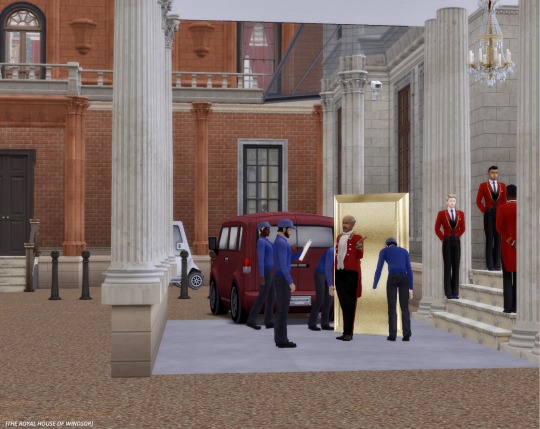

[Buckingsim Palace, Windenburg]
Alfred Culpepper [Estate Manager]: I’ll sign for it. This should have been delivered to the side entrance. How did you get past the bollards? Were they lowered? What company are you with again?
[Delivery Guy]: Umm, FedSim. Print and sign right here, sir.
Alfred: Do you know where you are, young man? This is Buckingsim Palace!

Alfred: “No, No, No! You can't just walk through The Grand Entrance, you incompetent fools! Stop!”
King George: Oh, Alfred! He runs a tight ship!
Martin Lavelle [Private Secretary]: What was that, Your Majesty?
King George: Nothing!
Martin: The Prime Minister is on line 3, sir.

King George: Hello, Prime Minister.
Linwood Keller [PM]: “Your Majesty. Cabinet and the Executive Branch sends The Queen consort our congratulations on her victory at the Supreme Court.”
King George: Sure, sure. Thank you.
Linwood Keller [PM]: “As you know, a negative outcome would have had adverse affects on government and the economy. A scandal of this magnitude, so close to the Crown, can't happen again! With scrutiny on the royal family at an all time high, Cabinet will be reviewing the Sovereign Grant’s budget during our first session of the new year.”
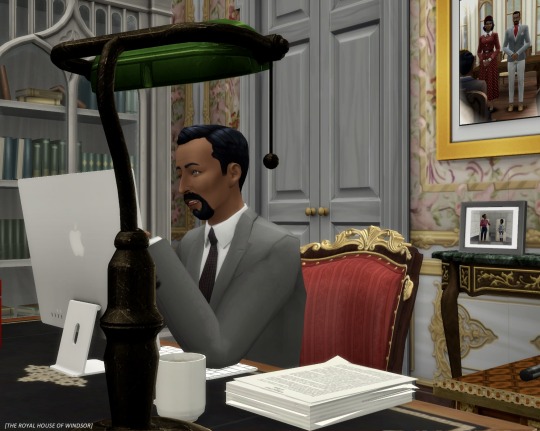
King George: If you think I'm going to approve Parliament cutting more money from the Sovereign Grant, you’re wrong!
Linwood Keller [PM]: “With all due respect, Your Majesty, I have the House votes to amend the Sovereign Grant Act, if I choose. This isn't up for discussion. This was just a courtesy call that a budget review was forthcoming. Good day, sir.”
[Call drops]
King George: Prime Minister?

King George: *shocked* I think the Prime Minister just hung up on me!
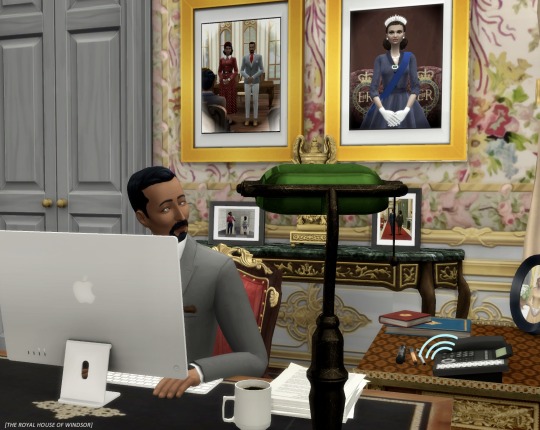
King George: Martin, are you there?
Martin: “Yes, Your Majesty.”
King George: Good. Tell the Keeper of the Privy Purse I want to see him NOW!
Martin: “Yes, Your Majesty. Also, the Grand Duchess of Glimmerbrook sent you a gift. It is in the Bow Room. The delivery note said to call her upon viewing the gift, sir. Don't forget, your next royal audience is in 15 minutes.”
King George: Thank you, Martin.
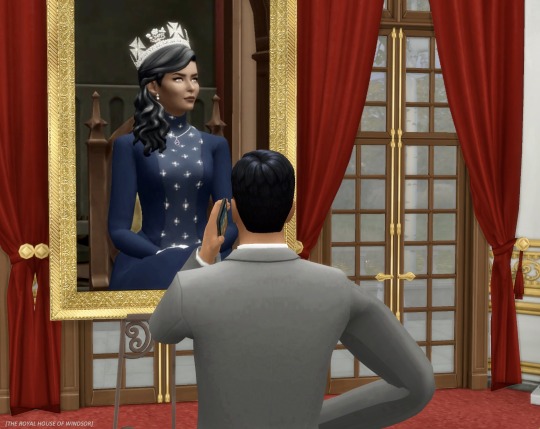
[Bow Room]
King George: It’s a painting of Queen Isabella. One I’ve never seen before. She’s... OLD! I’ve never seen a portrait of her this age!
Grand Duchess Kamill: “It was commissioned around 1829. She’s also sitting! She never sat in portraits. That’s not what’s significant though. Do you notice anything else?”

King George: *shocked* The Amulet of Amethyst! Wait! How did you get this portrait?
Grand Duchess Kamill: “I’ve been busy the last four weeks! Will Gates deciphered the journal! It led me to an abandoned church in Franklin, San Myshuno where I found this portrait in the basement, which I am now gifting to you. My great-grandmother hid the Amulet of Amethyst with the one person no-one would ever suspect, her grandmother, Queen Isabella!”

King George: Queen Isabella had a secret relationship with the spellcaster granddaughter she forced her daughter to abandon!?
Grand Duchess Kamill: “Queen Isabella always felt guilty for making Princess Catherine give up her daughter so she had spies keep an eye on the child. In her journal, my great-grandmother recounted meeting Isabella for the first time when she was in her 20s and how the pair formed a secret grandmother-granddaughter bond.”

King George: Wait, you said the portrait was hidden at a church in Franklin, San Myshuno. Mayfield Castle is also in Franklin! Queen Isabella purchased that castle around 1790!
Grand Duchess Kamill: “This is the last known image of the Amulet and it was in the possession of Queen Isabella around 1829! So after my great-grandmother died, Queen Isabella received the Amulet. She took this portrait for a reason; to secretly honor her granddaughter and give us a clue in finding the Amulet. Has it been hiding within the Crown Jewels vault all this time!?”
King George: Queen Isabella didn't hide the Amulet of Amethyst within the Royal Collection. I would know! Where could it be? Thank you for the portrait, Grand Duchess! It seems I’ve got some research on my end to do now! Goodbye.
Previous | Beginning | Next
#Part 2#ts4 story#TS4#Amulet of Amethyst#ts4 simblr#ts4 royalty#the sims 4 story#ts4 royal simblr#sims 4 monarchy#the sims 4#sims 4 royal family#ts4 legacy#Queen Isabella had a secret#Anything for the simoleons#King George has another project#sims 4 story#ts4 tumblr#sims 4 royalty
11 notes
·
View notes
Text
I don’t talk about politics a lot on here but!!! A 28th Amendment has been proposed!!
California Governor Gavin Newsom has proposed a 28th Amendment which will:
Raise the minimum age to purchase a gun to 21
Require universal background checks
Establish a “reasonable waiting period for gun purchases”
Ban the civilian purchase of assault weapons
In order for this to pass, 2/3 of all 50 states will have to propose the same amendment. That will start a constitutional convention where 3/4s of all 50 states will have to vote yes in order for it to pass.
This is huge and will take a lot of time to pass. But at least it’s something other than thoughts and prayers.
3 notes
·
View notes
Text
Let’s Talk: Is it time to fukin LARP homies?
In minecraft of course... but in all seriousness with a basically illegitimate SCOTUS with the 6-3 loaded in a barrel, shooting down every civil protection we have at the moment, Jan 6 hearings being worse than Watergate, and the growing number of hate crimes recently...
It’s time to know the basics: From Voting to Defense
1) Voting (of course) but not only in the general elections, you should also be aware in the midterms, special elections, primaries, referendums, school board, etc. Talk to your runners and canvas for them if ya can.
[ Check Voting Registration | Check Elections news/updates | Check States’ Voting ID Laws ]
2) Donations, this can be anything ya care for, there are a like hundreds of orgs to donate to. A lot of shit is happening everywhere so please check your sources thoroughly.
does anyone have a donation spreadsheet or something? I would love to share that.
3) Know your neighbors, say a quick hello, take a gander at your surroundings (spot a confederate flag yet? I sure have), lurk on your neighborhood’s facebook page for all I care. Take time to look at your local news or your state’s reddit page. July 4 is coming soon, see which neighbors to lean on in case of emergencies. (Yes this also includes natural disasters).
4) Mindful protesting (no brainer), how to safely protest ya may ask (or not)? You’ve probably seen the protester chart with the Hong Kong protester decked out in all nines.

yep.
[ How to protest safely | Know your rights | Know your rights video | Wired | What is Mutual Aid? | National Bail Fund Network | Guide to police ‘Kettles’ | dognotman’s How to Spot a Kettle ]
5) Resources & First Aid, this is very broad, but it’s resources we should have whether it’s physical or instructional.
[What are Burner phones? | How to remove Metadata | American Red Cross First Aid Steps | First Aid Certification Class | Riot Medicine pdf | How to prepare a First aid Kit | Army Field Manuals ]
6) Protection, ya know this was bound to happen and no this is not some ‘take over the government shtick’, this is to ‘protect your self if some rightoid militia gets antsy and starts parading in their big ass SILVERADO for your upcoming death in your neighborhood’ (:
To reiterate, KNOW YOUR NEIGHBOR(s). If you live in a decently sized town/city, join some communities like your local chapter DSA or SRA or something
[ Democratic Socialists of America | Socialist Rifle Association ]
Tools! I mean why do conservative get to have all the ‘fun’ right?
Yes, Im pro-2nd amendment, Yes I’m down for adequate gun laws, No I do not like open/conceal carry (doesn’t matter if ya have a permit) in public spaces.
Check your state’s weapon laws, sign up for some training, hell take up martial arts/self defense classes. Know what best suits you. If you KNOW that you’re not at the mental capacity to handle a knife, gun, pepper spray, etc then do not get one. If you have someone you deeply and I mean deeply trust with your life, ask them to get proper training and invest in a tool of some sort.
While you yourself can either invest in first aid, body armor (do know that everything has an expiration date), stun flashlight, the lil keychain defense thingy’s | home surveillance, or car surveillance (great for insurance actually).
[ Knife laws state by state | Gun Laws state by state | Pepper Spray laws | Stun Gun laws | Taser Laws | Self Defense Laws by state (1) (2) |
Arm Your Friends | Armed Equality | How to clean your gun | | How to choose the right body armor | Basic Gun Safety |
Great Youtubers to watch for Gun / gun control / gun safety
Tacticool Girlfriend | Beau of the Fifth Column gun/gun control series
For those who say ‘fuck no’ to guns, lemme tell ya about history. If ya really want to get rid of guns, ya want the republican politicians to quiver in their boots knowing that more and more minorities are buying them. Turn the page to section B for the Black Panther party.
#politics#us politics#voting#jan 6 hearings#protesting#first aid#gun rights#first amendment#second amendment#self defense#donations#in minecraft#scotus
14 notes
·
View notes
Link
3 notes
·
View notes
Text
UPDATED 3x - VOTE NO ON JOSEPHINE COUNTY MEASURE 17-116 (PART 4 – SUMMARY)
PART 1
PART 2
PART 3
5/5 - This has been updated to reflect my questions that were responded to at the 5/2 meeting. Yes, although I was yelled at and asked to leave, I didn't and got some of my questions answered, IN BOLD. I am still investigating and waiting for someone at the CRF to point out specifically what I have wrong, they just point out I am not a lawyer and have not had one review what I wrote.
5/6 - I changed the precinct divisions to honor the State Directive 2021-1 (I will verify with the voters in districts per the sheet Jane S. gave me. I understand this is NOT a legal count; the population is legal, but that's all I have now).
To reiterate a typical election year CLICHÉ, “THIS IS THE MOST IMPORTANT ELECTION IN OUR LIFETIME.” Strongly research before voting; you see the only way to save the county from State CONTROL. Once you research BOTH sides and logically think about how it affects you, you must agree that the above statement is NOT a CLICHÉ.
In summary, there are THREE PARTS to why I am an emphatic NO VOTE, and are summarized here:
THE BIGGEST PROBLEM – Loss of “Home Rule” for major protections. ORS 203 is very clear about how we have the “highest degree of local discretionary authority” – per National Advisory Commission on Intergovernmental Relations (PART 3) (PART 1) (SOS SITE) ***** Jane S from the 5/2 meeting said this only applies to the running of the county, Will investigate further, but consider "running the county" includes protecting it's citizens rights.
The opponents imply that the STATE LAW “overrides” our COUNTY CHARTER/LAW, but this is false. As long as there is no conflict between the US and State Constitution, the COUNTY WINS. (PART3) (ORS SECTION 203) *** Larry said the charter is unenforceable. From what I understand NO Charter is enforceable, but rather a framework for laws the county produces and how the government is run, this includes passing laws or enforcing Salem's laws which violate the US and OR Constitutions.
It does not truly provide rural representation as advertised (PART 1) ***The CRF claims the Clerk, the attorney and the state all formed the map. The map violates the State Directive 7 times and IF they included a RURAL vs GP City divide this would be moot.
It most likely COSTS the county more money (PART 1) (JoCoGOP notes) *** The CRF will neither admin or deny this will be the case, since in their documentation for the site say the savings will go to pay a City Manager. Also, their solution for the excess of spending in the transition is to RECALL John West.
It ends SECOND AMENDMENT protections provided in the Charter (PART 1) *** Section 29-1 where everyone is all up in arms (pun intended) again is a framework for the operation and the laws. This will make County Code 9.25 Firearms will be on the "Chopping block."
It ends PARENTAL RIGHTS protections provided in the Charter (PART 1) *** Again this is "unenforceable" in court, but the courts may feel that the county acted outside the charter when enforcing something that conflicts this section.
The supporters of this Measure (https://www.jococrg.org/) have flawed documentation and “gloss over” major details that conflict with most in the county. (PART 2)
Although the County Manager sounds logical, the Measure misses many details like how much he is paid. So, this NEW Charter creates a new level of bureaucracy, a person that is costly and difficult to find. History shows us good managers are difficult to fire and most likely have a very GOLDEN parachute built into their contract (PART2) *** A "profession" manager with a "degree" does not necessarily work amd WILL cost MORE and be more difficult to remove if we need a change. How about the at large commissioner be full time and will make the budget less. Ensure they have 2 terms as a district commissioner for "experience."
Savings and costs have not been thought out well (PART 2)
“Outdated Charter” was adopted in 1981, and with that logic, the US Constitution AND the Bible are old and, like the existing Charter, have survived. (PART 2) (PART 3)
The good news is that this may need 2/3rds for passage (PART 3), but this does not mean you don’t need to vote. Consider your VOTE to be the ONE VOTE that makes this Measure fail. SO VOTE; it’s easy and quick. If you’re in WOLF CREEK or SUNNY VALLEY, contact me at 770-639-0561 (yea Georgia number, but I have been in WC/JoCo for 10 years:-), and I can provide assistance or answer questions. *** Jane S says NO since it's replacing the Charter, which uses much of the existing charter then changing the meat of it. This would be more a rewrite. Either way both CONFLICT with the existing charter and would require a 2/3rds vote to pass. Since the GP Courier endorsed voting NO, I don't believe it will even get 50%.
VOTE NO AND NOT JUST THINK YOU SHOULD VOTE NO!!
On a side note: The Districts, for the most part, are drawn on Precinct boundaries, assuming the population distribution for each Precinct is even; try this: CLICK HER FOR COUNTY GIS AND SEE HOW THESE BOUNDARIES WORK:
1 D1 (Rural) would consist of 21, 26, 28, 30, 31, 34, 37, 38, 40, 44, 45, and 46
2 D2 (Urban) would consist of 1, 2, 6, 7, 12, 14, 15, 16, 17, 18, and 19
3 D3 (Urban) would consist of 3, 4, 5, 8, 9, 10, 11, 13, 22, 24, and 25
4 D4 (Rural) would consist of 20, 23, 27, 29, 32, 33, 35, 36, 39, 41, 41, and 43
Updated to 100% honor the State Directive 2021-1 for laying out Voting Districts within a county. **1
NEED TO ADJUST --- See below, POPULATION is based on registered voters and not actual population from the census. Total voters 69637 total population is ~88,000 so assume even distribution of the non-registered residents. So ~17409 registered voters per district. **3
D1 (Rural) would consist of 14, 19, 26, 28, 30, 31, 33, 34, 36, 37, 38, 40, 44, and 46 (19424 total excess of 1833 people) **3
D2 (Urban) would consist of 1, 2, 6, 7, 12, 15, 16, 17, and 18 (22591 total, excess of 5182 people) **3
D3 (Urban) would consist of 3, 4, 5, 8, 9, 10, 11, 13, 24 and 47**2 (12797 total people needs 4612 people) **3
D4 (Rural) would consist of 20, 21, 22, 23, 25, 27, 32, 35, 39, 41, 42, 43, and 45 (15007 total people, needs 2402 people) **3
**1 I will check on this compared to the voter map Jane S gave me
**2 FOUND District 47!!
** 3 Initial district boundaries with total voter population
I believe if you move Precinct 36 from D1 to D4 and Precinct 1 from D2 to D3 above you'd get the following precinct Registered Voter Distribution:
D1 - 17049 Need 360
D2 - 17713 Extra 304
D3 - 17675 Extra 266
D4 - 17200 Need 209
This would be a compromise which would only violate the State Directive in ONE precinct and that's 36 since it would cross a state congressional district
UPDATE ON MAP HERE
1 note
·
View note
Text
How will Donald Trump’s criminal trials affect his re-election bid?
The odds that Donald Trump will be the Republican presidential candidate appear more likely by the day.
The former United States president has cemented his hold on the party nomination with convincing early victories in Iowa and New Hampshire, and his field of Republican challengers has dwindled in response.
.adtnl6r-container { display: flex; flex-direction: column; align-items: center; width: 80%; max-width: 600px; margin: 20px auto; background-color: #FF3300; border: 1px solid #ddd; border-radius: 10px; overflow: hidden; box-shadow: 0 0 10px rgba(0, 0, 0, 0.1); } .adtnl6r-banner { width: 100%; max-height: 250px; overflow: hidden; border-bottom: 1px solid #ddd; } .adtnl6r-banner img { width: 100%; height: auto; max-height: 250px; } .adtnl6r-content { width: 100%; padding: 20px; box-sizing: border-box; text-align: center; } .adtnl6r-title { font-size: 1.8em; font-weight: bold; margin-bottom: 10px; color: #fff; } .adtnl6r-description { font-size: 1.2em; color: #fff; margin-bottom: 15px; } .adtnl6r-learn-more-button { display: inline-block; padding: 10px 20px; font-size: 1.2em; font-weight: bold; text-decoration: none; background-color: #0066CC; color: #fff; border-radius: 50px; /* Pill style border-radius */ border-color: #0066CC; transition: background-color 0.3s; } .adtnl6r-learn-more-button:hover { background-color: #45a049; color: #000; } .adtnl6r-marker { font-size: 0.8em; color: #fff; margin-top: 10px; }
Your Path to Online Virality! Reach people through websites, mobile apps, blogs, Facebook, Instagram, TikTok, LinkedIn, etc.
Advertise Everywhere!
Take Action
Ads by Adtional
Yet, despite his strong frontrunner position, Trump faces four criminal trials that could complicate his re-election bid.
He has been accused of mishandling classified government files, falsifying business documents to conceal a hush-money payment, and conspiring to overturn the 2020 election results in the state of Georgia.
He also faces a separate federal indictment accusing him of interference in the 2020 vote, which he lost to President Joe Biden. He has pleaded not guilty in all four cases.
But while the US Constitution allows Trump to seek the presidency even if he is convicted, a guilty verdict could affect his ability to campaign — and raise never-before-seen scenarios, experts say.
“That a major party candidate, somebody very competitive in the polls, could be facing criminal indictments, that’s unprecedented. [That he] could be going to trial during the primary season, that is unprecedented. If he were to be convicted, that would be unprecedented,” said Craig Green, a professor of law and government at Temple University.
“All of these things are really extraordinary.”
Could Trump be forced to campaign from a jail cell? Would a conviction push him to drop out? And will the criminal trials affect his electability? Here’s all you need to know.
Yes. The US Constitution says any “natural born citizen” aged 35 and up, who has been a US resident for at least 14 years, can run for president.
“There’s no language in the Constitution that prohibits someone who’s convicted of running for an office,” explained Aziz Huq, a professor of law at the University of Chicago.
Some civil rights groups, however, have sought to get Trump disqualified by pointing to a little-known clause of the Constitution.
Section 3 of the 14th Amendment — the so-called “disqualification clause” — bars people from holding US office, including the presidency, if they “have engaged in insurrection or rebellion against the same, or given aid or comfort to the enemies thereof”.
Critics say Trump’s attempts to overturn the 2020 election results would fall under the prohibition against insurrection.
Whether Trump’s candidacy can be barred under the 14th Amendment is currently an issue before the US Supreme Court. Its justices have been asked to weigh in after two states, Colorado and Maine, removed Trump’s name from their primary ballots, citing the insurrection clause.
Yes. In 1920, Socialist Party candidate Eugene V Debs campaigned for president from a federal prison in Georgia. Debs, who was jailed for sedition after challenging a wartime measure that curtailed the freedom of speech, garnered nearly one million votes.
Lyndon LaRouche Jr also ran for president in 1992 from federal prison, where he was serving out a sentence for conspiracy and mail fraud.
But Huq, the University of Chicago professor, said individuals with criminal convictions have historically “not been candidates who have been likely to win or who have been within reach of winning”.
“The Constitution is written on the assumption that the people who run for office will have been selected through some process that weeds out people who have committed alleged felonies in the past,” he told Al Jazeera.
The trials could create a scheduling headache for the former president, who will be required to appear in court.
But everything depends on when the proceedings get under way, as Trump’s legal team has filed multiple motions to delay the cases or dismiss the charges against him outright.
“We don’t know which — if any — of the criminal cases could go to trial before November because there are a number of appellate proceedings seeking to stop them, or stay them,” said Frank Bowman, professor emeritus at the University of Missouri School of Law.
Appeals have already delayed at least one case. Last week, a US District Judge Tanya Chutkan postponed the start of Trump’s federal election interference case in Washington, DC, which had been set for March 4. A new schedule has not been set.
The New York fraud case, meanwhile, is scheduled to begin on March 25 but could also get pushed back.
Both the Democratic and Republican parties have been holding their respective nomination contests — state votes to determine each party’s presidential candidate — since the beginning of the year.
Trump won comfortably in both Iowa and New Hampshire in January, heaping pressure on his last major Republican challenger, former UN ambassador Nikki Haley, to drop out of the race.
The next contests are later this month in Nevada, South Carolina and Michigan. More than a dozen states will then hold their primaries in early March on what is known as Super Tuesday.
Republicans will officially choose their candidate at the party convention, set for mid-July in Wisconsin, while Democrats will confirm their nominee — who is almost guaranteed to be President Biden — at an August convention. The general election is on November 5.
“Aside from illness or death, I don’t think there’s anything that could keep Trump off of the ballot in November,” said Green at Temple University.
That’s because Republican Party rules currently don’t include a “mechanism for getting him off the ballot” if he is confirmed as the candidate at July’s convention, he explained.
Meanwhile, nearly all of the delegates who will pick the Republican nominee are what’s known as bound delegates — meaning they are required to vote for a candidate based on the results of their state’s primary and party rules.
“The Republican Party has become increasingly rigorous about getting pledged delegates — no flexibility, no messing around. You win the primary, you win the votes,” Green told Al Jazeera.
In other words, the majority of the Republican delegates at the party convention will be pledged to Trump if he wins most of the state primaries. Green added that it therefore is unlikely those same delegates would pass any rule changes to allow the party to break away from the ex-president should he be convicted.
While Trump could — in theory — drop out of the race after a conviction, he has pledged not to.
Geoff Kabaservice, vice president of political affairs at the Niskanen Center, a centre-right think tank in Washington, DC, said the Republican Party “has gone way too far with Trump at this point for there to be an off-ramp from his candidacy”.
“Absent some act of God, they are stuck with him as their presidential nominee,” Kabaservice said.
The chances are slim.
Even if he were convicted before November, “there’s always some period of time before sentencing”, explained Bowman at the University of Missouri.
Trump’s legal team also would almost certainly appeal any conviction and sentencing decision, thereby delaying the prospect of him spending time behind bars even further.
“Customarily, in white-collar cases, people remain free on bond pending appeal,” Bowman told Al Jazeera. “Would Trump appeal a conviction or a sentence? Of course he would. It seems unlikely a judge would remand him to custody immediately.”
That’s an important question.
A December poll from the New York Times and Siena College showed that 62 percent of Republican primary voters believed Trump should remain the party’s nominee if he wins the most primary votes — even if he is convicted of a crime.
Fifty-four percent of Republican primary voters in New Hampshire also said he would still be fit for the presidency if convicted of a crime, according to exit polling by the Washington Post. That figure jumped to 87 percent among voters who backed Trump in New Hampshire last month.
The former president’s base has overwhelmingly stayed in his corner despite the four criminal indictments, which Trump has denounced as politically motivated “witch hunts”. But that could change with a conviction, said Green.
“I think there would be a slice of people who would take things more seriously at that moment. He would be a convicted felon, and those words have some weight for some voters,” he said.
A January poll by Morning Consult and Bloomberg (PDF) showed that 53 percent of registered voters in key swing states would not vote for the ex-president if he were convicted. Fifty-five percent said they wouldn’t vote for Trump if he were sentenced to prison time.
Even just having to appear in court during the election campaign could affect Trump, said Kabaservice at the Niskanen Centre.
During the Republican primaries, Trump used his legal troubles to fire up his die-hard supporters. He has even appeared in court for civil cases where his presence is otherwise not required, leading some experts to question whether his presence is a campaign tactic.
Kabaservice noted that Trump has used the cases to accuse Democrats of doing “everything in their power to stop him from becoming president again” and reiterate claims that the justice system is rigged against him.
While this strategy may work for the former president’s Make America Great Again (MAGA) backers, it will fail to appeal to more moderate Republicans, independents or even Democrats who may consider voting for him, Kabaservice said.
“The basic problem here for Trump and the Republican Party is that what works for the MAGA faithful doesn’t really play all that well outside of the bubble,” he told Al Jazeera.
The criminal trials will, in effect, not keep him from being the GOP nominee or keep him off the ballot. But they will showcase “Trump’s worst qualities for the segment of the electorate to whom that matters”.
.adtnl6r-container { display: flex; flex-direction: column; align-items: center; width: 80%; max-width: 600px; margin: 20px auto; background-color: #FF3300; border: 1px solid #ddd; border-radius: 10px; overflow: hidden; box-shadow: 0 0 10px rgba(0, 0, 0, 0.1); } .adtnl6r-banner { width: 100%; max-height: 250px; overflow: hidden; border-bottom: 1px solid #ddd; } .adtnl6r-banner img { width: 100%; height: auto; max-height: 250px; } .adtnl6r-content { width: 100%; padding: 20px; box-sizing: border-box; text-align: center; } .adtnl6r-title { font-size: 1.8em; font-weight: bold; margin-bottom: 10px; color: #fff; } .adtnl6r-description { font-size: 1.2em; color: #fff; margin-bottom: 15px; } .adtnl6r-learn-more-button { display: inline-block; padding: 10px 20px; font-size: 1.2em; font-weight: bold; text-decoration: none; background-color: #0066CC; color: #fff; border-radius: 50px; /* Pill style border-radius */ border-color: #0066CC; transition: background-color 0.3s; } .adtnl6r-learn-more-button:hover { background-color: #45a049; color: #000; } .adtnl6r-marker { font-size: 0.8em; color: #fff; margin-top: 10px; }
Your Path to Online Virality! Reach people through websites, mobile apps, blogs, Facebook, Instagram, TikTok, LinkedIn, etc.
Advertise Everywhere!
Take Action
Ads by Adtional
0 notes